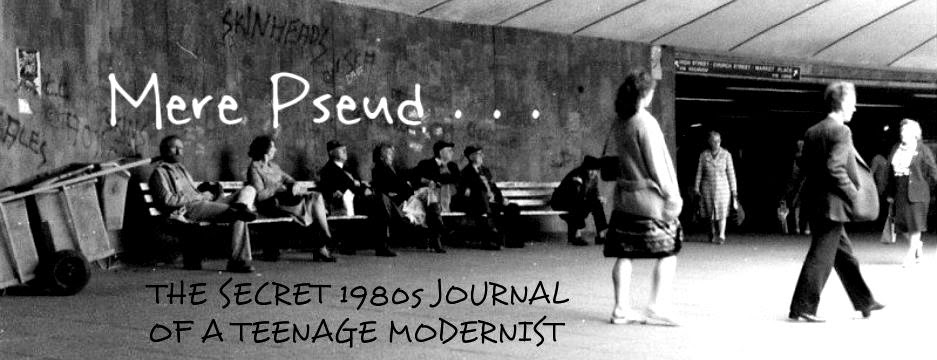Thursday, March 1, 1984
Machinations
Walking home from the Art College through Watermouth at one-thirty p.m., the weather calm, warm sun on my back, spring rushing down and the air filled with its smells and tempers—fish and chips with vinegar, warm stale beer, fruit on the stalls of St. Stephen’s market and the flat drone of the bookies' tannoy.
I passed an old lady on the street, her blue eyes piercing me as we came across one another on the pavement, her wrinkled face powdered, a pathetic vanity fooling no one. She spied my unlovely form, our eyes met, and I could see in them a look of hard, brittle coldness. She couldn’t know the quiet acceptance with which I viewed the world and her and everything that I passed—she just looked for a moment and saw the broad criminality of my face and the shabbiness of my coat and clothes.
I walked on, engrossed in reveries and words that wouldn’t come, and my mind with all its aches and pinpricks of vanity and self-aggrandisement dissolved away into the warm breeze.
Called in at 12 Westdorgan Rd. on my way home and Lindsey gave me a cup of coffee and some toast before she departed, to the station, to collect a consignment of RCP newspapers under the pseudonym Lindsey Black. She was sheepish when she told me this last bit. A man from the Irish Freedom Movement is coming down today from London but there’s no meeting organised for him to attend. Stu roused himself later: he and Pete had done the acid last night, and he had stayed home while Gareth and Pete went to the Flamingo. I saw Pete briefly and he enthusiastically described the trip to me. . . .
I realised fully today, and with a depth of understanding not present before, the magnitude of my blunder in choosing a University degree course. I can’t believe my mind worked as it did. All I can think of is the two years I’ve wasted, yet I’m bogged down two-thirds of the way through a course which means exactly nothing to me. I felt the urge to go to see my personal tutor and tell him everything, knowing it futile yet needing the emotional relief a confession would bring. My position can’t change and therefore my dismal machinations are useless. I even went to see the Fine Arts Secretary to ask her about extra-curricular courses run by the Poly, and although she gave me another room number to follow up I didn’t—somehow it all felt like a feeble attempt to rectify a lost position. My opinion on this has to change, and I know it probably will, but this is how I feel.
At six p.m. Pete and I met up with Lee, Alex, Ian and Gav at room 312 in the Art College. We returned to the offices of the Planning Dept. and, one by one, scaled the wall, ran silently across the low roof to the small toilet window (the only point of access) and slithered through, feet first. Much to Lee and Gav’s chagrin, the plastic bags of photographic paper had been disturbed. A few boxes were empty, and others seemed to have been deliberately opened and the paper exposed. Nine boxes of a hundred sheets each were gone.
So, after angry whisperings and theories and flittings to-and-fro, in single file we moved all the bags through the dark, derelict corridors and offices, down into the cellars, into an adjacent boathouse, and out onto the beach . . . I had a brief vision of us, like some well organised band of big-time crooks with our flashlights and gloves, as we efficiently carried off the loot.
From then on it was a simple (if risky) task to take all the stuff back up to Maynard Gardens and to Lee’s new room in studio 207, a tiny cupboard-like workspace with desk, sink and toilet that he’s very pleased with. Ian vanished, as only Ian can do and didn’t seem to view events with too kindly an eye I don’t think. Pete returned to Castle Mount Court and Mo, and Gav hurried off somewhere too, so Lee, Alex and I came home to Jervis Terrace.
I’ve inhibited myself by assembling loose, unstructured thoughts and word-fragments into a book form. There’s no freedom of expression here. Self-consciousness is not the way. Words dissemble, hence my yearning for other forms. No matter how much I might explore an idea or a thought or a physical object, it’s impossible to capture in words its totality as a pure and perfect expression of Reality. I could amass a library of adjectives to describe its structure and surface characteristics such as colour, texture, shape etc., but the essence of my subjects will never come across as they are i.e., simply, and with swift and incontrovertible awareness and acceptance.
The mechanics of reader comprehension inhibit the usefulness of prose as a descriptive tool and this I suppose is the reason behind poetry’s appeal. Poetry attempts to paint a picture in words and achieve an acceptable representation of existing ‘wholeness’, but prose is altogether more aloof and laborious. This is why I’m attracted to the visual arts, for they transmit awareness instantly, or at least as swiftly as the eye and brain can engage. This journal-script is ponderous because orthodox prose conventions are ponderous, and they at best gives the dimmest and crudest representation of my mental and physical experience.
Subscribe to:
Post Comments (Atom)




No comments:
Post a Comment